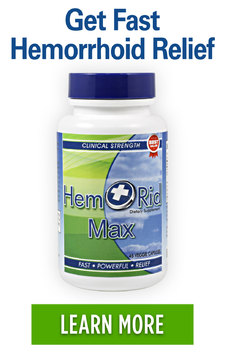Do Hemorrhoids Leak? Are You Dealing With Discharge and a Leaky Hemorrhoid?
Posted on 21 October 2018 by Maryanne Johnson
Share this post
Do your hemorrhoids leak poop or have a discharge? Hemorrhoids are a common condition faced by many patients. Symptoms of hemorrhoids have been reported to be particularly bothersome.
That’s because if you aren’t dealing with uncomfortable itchiness or serious pain, you are dealing with other symptoms that are embarrassing.
One of the most commonly reported embarrassing symptom of hemorrhoids is leakage. Leaky hemorrhoids are the worst!
Hemorrhoids leak when you suffer from loss of control of the anal sphincter due to inflammation. In more simpler terms, hemorrhoids can cause leakage when things are aggravated down there. There are actually quite a few causes and solutions we will discuss in this post.
To understand why hemorrhoids leak, it’s important to learn more about hemorrhoids. And, while it may seem dreadful to hear that hemorrhoids do leak, it’s important to understand that there are ways to treat this common condition.
What Are Hemorrhoids?
Hemorrhoids occur when the pillow-like clusters of veins that lie beneath the mucous membranes lining the lower part of the rectum and anus become inflamed. Hemorrhoids fall into one of two categories.
Hemorrhoids are either internal or external.
Internal hemorrhoids occur in the lower rectum and are not seen or felt. They are not associated with many symptoms and can often go undetected. External hemorrhoids occur around the opening of the anus.
They are associated with several uncomfortable symptoms including pain, swelling, bleeding, and itching, to name a few.
What Causes Hemorrhoids and What Are the Signs?
Hemorrhoids are caused by several factors including lifestyle habits, eating habits, genetic conditions, and other medical issues. The most common causes of hemorrhoids are:
- Chronic constipation
- Straining during bowel movements
- Prolonged periods of sitting
- Low fiber diet
- Not staying properly hydrated
- Obesity
- Chronic diarrhea
- Pregnancy
Signs and symptoms of hemorrhoids include:
- The presence of blood during or after bowel movements
- Itching and irritation in the anal area
- Pain when sitting
- Pain during or after bowel movements
- Swelling around the anus
- A lump near the opening of the anus
- Anal leakage
- An unpleasant odor
- Burning and itching
Why Do Hemorrhoids Leak?
When hemorrhoids become inflamed, they can cause a partial loss of control in the lower part of the rectum. This loss of control can cause leakage of mucus, bacteria, and stool.

When this occurs, you may experience another embarrassing symptom. When hemorrhoids leak, they may also emit an unpleasant odor.
According to the American College of Obstetricians and Gynecologists, one of the common causes of bowel leakage is prolapsed hemorrhoids. Leakage can include gas, liquid, or solid stool.
While it can be a nuisance when hemorrhoids leak, there are many different ways to treat them so you don’t have to deal with this embarrassing symptom.
How to Treat Leakage with Hemorrhoids
There are several ways you can treat hemorrhoids that leak. Since leakage is typically associated with prolapsed hemorrhoids, it is important to use treatment that has been proven to resolve prolapsed hemorrhoids.
Prolapsed hemorrhoids are grade III or grade IV internal hemorrhoids. With grade III internal hemorrhoids, the hemorrhoid protrudes out of the anal opening, but can be pushed back in with your finger. Grade IV prolapsed hemorrhoids are protruding hemorrhoids that do not simultaneously retract.
Prolapsed hemorrhoids can be treated in several ways.
The most common prolapsed hemorrhoid treatments include:
- Proper self-care to reduce symptoms. Self-care includes:
- The use of ice packs to reduce inflammation
- Warm sitz baths can work great for hemorrhoid pain
- Over-the-counter creams, ointments, and suppositories
- Avoid straining during bowel movements
- Not waiting to have a bowel movement when you have the urge to go
- Eating a high-fiber diet
- Keeping stool soft with a stool softener if you do not have a high-fiber diet
- Drinking plenty of water
- Exercising regularly
- hemorrhoid pills for pain management
- hemorrhoid fiber gummies or supplements
- Medical treatment from a doctor or specialist. If symptoms are more severe and do not resolve on their own, you may need to seek assistance from your medical provider.
-
Non-invasive medical procedures including:
- Rubber band ligation which involves placement of a rubber band at the base of the hemorrhoid to cut off blood supply.
- Sclerotherapy which involves injecting a chemical into the hemorrhoid. The chemical causes the hemorrhoid to shrink.
- Coagulation therapy which is also called infrared photocoagulation. This treatment uses infrared light, heat, or extreme cold to cause the hemorrhoid to retract and shrink.
- In the most severe cases, surgical treatments are necessary. Surgery with anesthesia includes:
- A hemorrhoidectomy which involves the placement of an incision to cut out the hemorrhoid.
- A hemorrhoidopexy which involves surgical stapling to cut off the blood supply to the hemorrhoid and cause it to die off.
Conclusion
It may be a cause of concern to hear that hemorrhoids do leak. But, leakage is usually associated with grade III or grade IV internal hemorrhoids. There are several treatment options available to reduce prolapsed hemorrhoids and resolve the embarrassing symptoms of leakage.
If at-home treatments do not work, please consult a hemorrhoid physician for further assistance in treating these bothersome symptoms of hemorrhoids.





0 comments